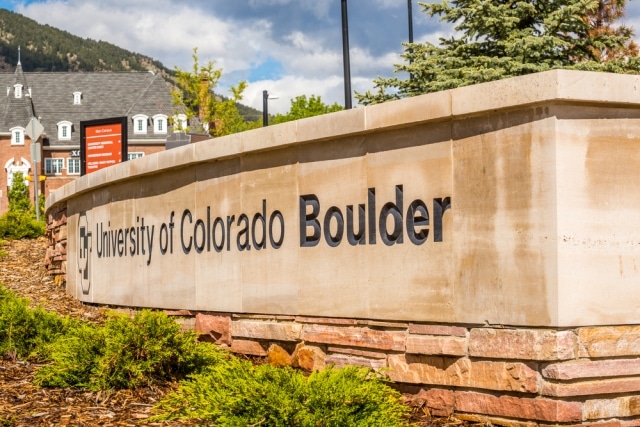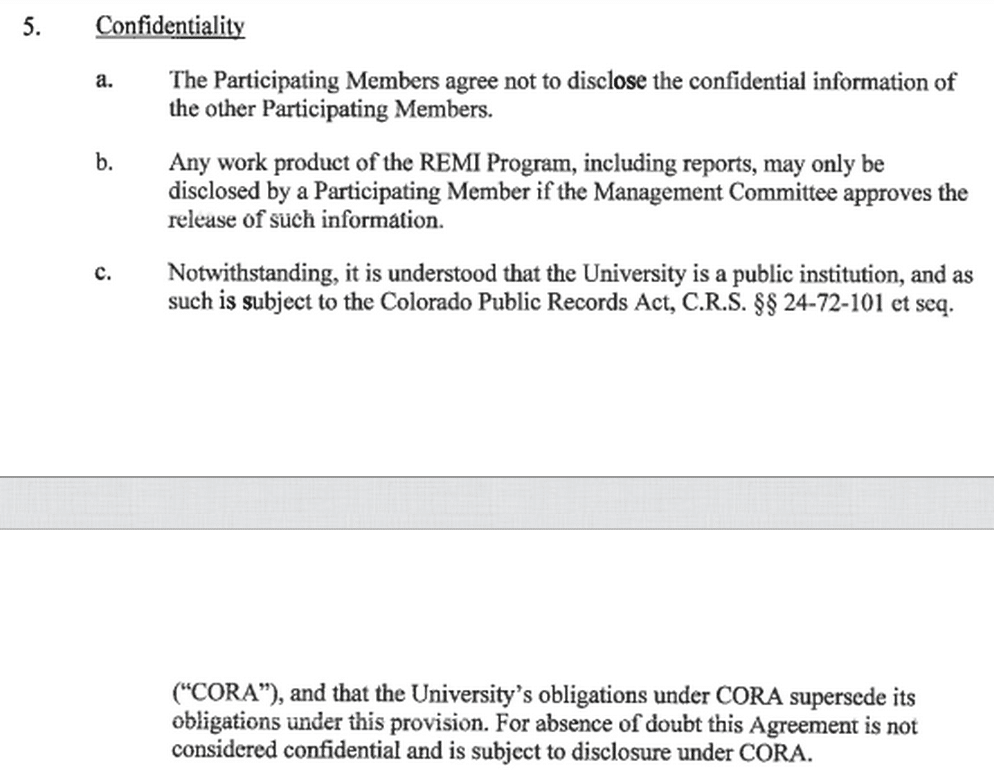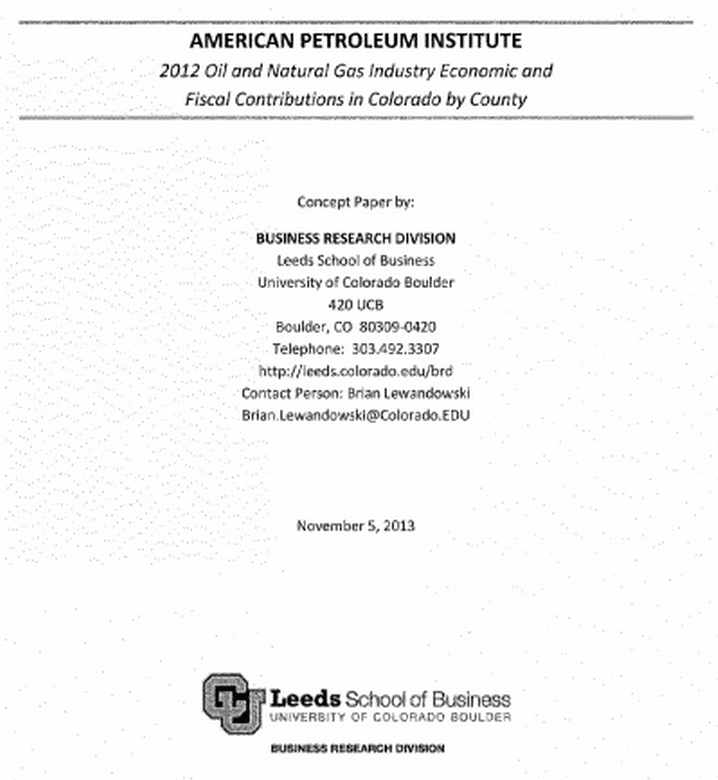Boulder Weekly, a Boulder, Colorado alternative weekly newspaper, has published a 10,000 word ”frackademia” investigation in a special edition of the newspaper.
The long-form investigation by Joel Dyer — based on thousands of documents obtained by Greenpeace USA — exposes the ongoing partnership between the University of Colorado-Boulder’s Leeds School of Business and the Common Sense Policy Roundtable (CSPR), the latter an oil and gas industry front group. The investigation reveals connections to Koch Industries, American Petroleum Institute, and Encana, among others.
University of Colorado, in this case, sat in the center of a tight-knit network of Colorado movers-and-shakers with ties to the oil and gas companies and public relations firms maintaining them as clients. That network is well-displayed in the LittleSis map created below by Greenpeace USA researcher Jesse Coleman and Boulder Weekly has created seven influence maps of its own.
The story begins in April 2013, when CSPR signed an agreement with University of Colorado for the latter “to provide unbiased, third-party research” on behalf of CSPR, as seen in the proposal obtained by Coleman. While self-serving as a principle, the research ended up as anything but “unbiased.”
The “Documents…reveal that the studies were conceived of, edited and strategically used by PR firms to influence fracking policy in Colorado, yet CSPR’s financial ties to the oil and gas industry were not disclosed to the media or in the published studies,” wrote Coleman in an article piggy-backing off of the Boulder Weekly investigation. “CSPR set priorities for the researchers, prioritizing oil and gas work. The studies were aimed at politically contentious topics, like local regulation over fracking wells.”
Other topics covered in CSPR reports done with University of Colorado’s stamp on them including the economic impact of a fracking ban, the economic impact of fracking in Colorado, an economic assessment of Colorado’s oil and gas prices and fracking and job creation in Colorado.
CSPR describes itself on its website as, “free-enterprise think tank dedicated to the protection and promotion of Colorado’s economy” and has a Board of Directors featuring Lem Smith, a lobbyist for hydraulic fracturing (“fracking”) giant Encana, a fracking company listed as a “partner” in its 2011 annual report. Smith is also on the Board of Directors of Western Energy Alliance, an oil and gas industry front group.
Shady MOU
Perhaps the most damning part of the Boulder Weekly deep-dive pertains to the Memorandum of Understanding (MOU) signed between the Leeds School of Business and CSPR. It is a document that wasn’t forked over under the Colorado Open Records Act (CORA), but eventually handed over after he hounded the University for document now published online by Greenpeace USA.
Image Credit: University of Colorado-Boulder
Dyer had to hound the University for the document even though it contains language reading, “This agreement is not considered confidential and is subject to disclosure under CORA.”
“What I got from CU in the original request was an old email exchange from Strohm saying the MOU was attached along with five pages of giant black squares. They were 100 percent redacted,” he explained. “Clearly there was something fishy going on. Why black out a document that actually says it is sharable under CORA? The answer is someone at CU didn’t want us to see the MOU for a reason known only to CU.”
In the case of the MOU itself, the dirt is in the fine print.
“The MOU leaves no doubt who is running the…show. Whatever management committee powers CSPR grants to its funders, in the end even those are subject to CSPR board oversight,” wrote Dyer, who also explained:
And how about this jewel: No work product…including reports, can be disclosed by any participating member unless the management committee approves the release. Ever. Let me translate that.
CSPR and its funders can research any issue they choose, but they have no obligation to release any reports that don’t match their political purposes. CSPR and its funding partners may not be able to significantly influence the Leeds researchers’ findings, but by holding the power over what does and doesn’t get released, they still ultimately control the…project outcomes in that fashion.
The terms of the MOU, unsurprisingly, paid off in terms of the deliverables that would follow.
API Buys Study
Enter a University of Colorado study conceived of by API research analyst Marcus Kobilz.
Emails and other documents obtained by Greenpeace reveal API had a heavy hand in editing the study and contributed to the media roll-out plan after the study API funded was published. University of Colorado’s Brian Lewandowski — head researcher for the project —at one point revised the report and sent it back to API, writing in an email, “I hope this new version is in line with what you envisioned.”
Image Credit: University of Colorado-Boulder
Originally the study had a huge API stamp at the top and the current version of it, up on API‘s website, lists it as a “Report for the American Petroleum Institute” in a smaller font.
The Koch Connection
At the heart of the story are the people and public relations firms who made the collaborative effort possible.
“CSPR was created by the Starboard Group and staffed in part by EIS Solutions – two PR firms with close ties to the oil and gas industry, including the billionaire Koch brothers,” explained Coleman. “Earlier this year, the two firms were revealed to be behind a web of front groups in Colorado that oppose regulations on fracking.”
One of Starboard Group’s clients is Americans for Prosperity (AFP), the front group founded and funded by Koch Industries and the Koch brothers. Starboard was founded by Kristin Strohm, who also heads up CSPR. CSPR, more or less, is just a Starboard Group front.
“While Strohm is listed as the executive director of CSPR, she isn’t paid by CSPR,” wrote Dyer. “According to the organization’s Form 990 return, CSPR appears to pay no full-time staff. Instead, CSPR actually pays $60,000 a year to the Starboard Group for administrative duties. Strohm is paid to administrate CSPR by the Starboard Group.”
But the connections run even deeper than that, as Coleman’s article lays out:
As a political fundraiser, Kristin Strohm has successfully solicited major funding from the Koch brothers. While Strohm was the finance director for [U.S. Rep.] Mike Coffman’s [R-CO] congressional campaign, in which Coffman benefited from ads run by Americans for Prosperity, the Koch brother’s flagship political group. Through Strohm, Coffman also received the maximum possible donation allowed by law from David Koch
(Snip)
With Strohm at the helm, CSPR works hand in glove with the Koch political apparatus. CSPR lists “finalizing plans for 2014” with Americans for Prosperity Foundation as a “Strategic Objective.”
Further, Dustin Zvonek — former head of AFP in Colorado and now AFP Regional Director — formerly served as CSPR‘s policy advisor.
Policy Impact
Of course, “frackademia” is all for naught unless it gets results. And results “frackademia” got at University of Colorado in the form of its “Hydraulic Fracturing Ban: The Economic Impact of a Statewide Fracking Ban in Colorado” report published in 2014.
That report was published in the middle of Colorado’s ballot initiative fight, in which many localities attempted to assert local control over fracking.
“The study’s release was strategically planned by Starboard Group and EIS Solutions, two influential PR firms with oil and gas clients,” explained Coleman. “CSRP’s own literature claims the study had a profound impact, boasting that the report was cited in all debates’ on fracking ballot initiatives.”
Eventually, with the acquiescence of Colorado’s Democratic Party establishment, the ballot initiative died a slow death and actually never even made the ballot for the November 2014 election.
“It’s difficult to understand how [this] wasn’t more cause for concern,” wrote Dyer. “But that appears to be the case. Nothing in the CORA documents indicates that anyone at CU or the Leeds School ever raised an issue over how [the] research was being used in the real world.”
Frackademia Alive and Well
As a recent report published by Public Accountability Initiative has made clear and as Boulder Weekly and Greenpeace USA have made crystal clear, “frackademia” is alive and well as fall semester 2015 gets underway.
In this case, API and other vested interests used University of Colorado to perform the well-honed propaganda “third party technique.”
At the end of the day, it’s just another sordid chapter in the ever-developing contemporary history book that is universities for sale to the frackers.
Photo Credit: Shutterstock | Sopotnicki
Subscribe to our newsletter
Stay up to date with DeSmog news and alerts








